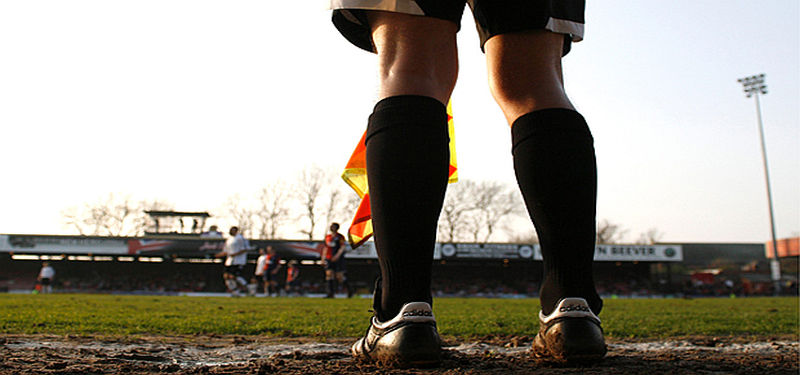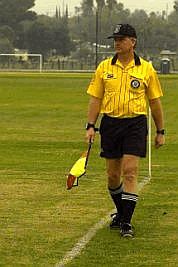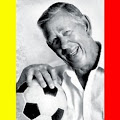| |
 |
Assistant Referees Flag Technique Simple Training Program
Andrew Castiglione
Founder of Ken Aston Referee Society
 |

| The aim of this page is to provide a simple flexible way to
practically train Assistant Referees in the art of carrying and
using the flag while running along the touchline. The training
does not have to be done on a field of play touchline, it can be
done anywhere, where there is a maximum 60 meter long area. This
program is primarily for an Instructor's use while training
Referees, but it can also be used by an individual too! |
 |
 |
The image above shows the various flag and lining positions that an
Assistant Referee will need to use.
A full set of individual flag signal images can be seen on the
+- Referees Signals -+ page.
 - 1. Corner Kick Flag Signal: The Assistant Referee should run to the
corner flag, then turn to face towards the center Referee, whilst
pointing the Flag downwards towards the base of the corner flag post,
using the hand that is nearest to the goal line.
- 1. Corner Kick Flag Signal: The Assistant Referee should run to the
corner flag, then turn to face towards the center Referee, whilst
pointing the Flag downwards towards the base of the corner flag post,
using the hand that is nearest to the goal line.
During training the instructor should shout "CORNER" to get the
Assistant Referees to sprint to the corner flag and make the signal.
 - 2. Goal Kick flag signal: Face towards the halfway line at right
angles to the field of play whilst pointing the flag into the field of
play at 90 degrees away from the body. Stand (or move) adjacent to the
goal area line (approx 5.5m (6 yds) up the touch line, away from the
corner flag.
- 2. Goal Kick flag signal: Face towards the halfway line at right
angles to the field of play whilst pointing the flag into the field of
play at 90 degrees away from the body. Stand (or move) adjacent to the
goal area line (approx 5.5m (6 yds) up the touch line, away from the
corner flag.
During training the instructor should shout "GOAL KICK" to get the
Assistant Referees to sprint to the correct position and make the
signal.
 - 3. Attention Referee!: Wave the flag 'to and fro' above you. Use this
signal to gain the attention of the center Referee. (For example - when
violent conduct has been seen.) Wave the flag vigorously backwards and
forwards until the center Referee sees it.
- 3. Attention Referee!: Wave the flag 'to and fro' above you. Use this
signal to gain the attention of the center Referee. (For example - when
violent conduct has been seen.) Wave the flag vigorously backwards and
forwards until the center Referee sees it.
During training the instructor should shout "ATTENTION REFEREE" to get
the Assistant Referees to stop immediately and make the signal by waving
their flag 'to and fro' in the air.
 - 4. Throw-In to the right: Facing the field of play - put the flag out
at a 45º degree angle from the body indicating the direction of the
throw-in. Use the right arm to indicate right.
- 4. Throw-In to the right: Facing the field of play - put the flag out
at a 45º degree angle from the body indicating the direction of the
throw-in. Use the right arm to indicate right.
During training the instructor should shout "THROW-IN RIGHT" to get the
Assistant Referees to stop immediately and make the correct signal.
 - 5. Throw-in to the left: Facing the field of play - put the flag out
at a 45º degree angle from the body indicating the direction of the
throw-in. Use the left arm to indicate left.
- 5. Throw-in to the left: Facing the field of play - put the flag out
at a 45º degree angle from the body indicating the direction of the
throw-in. Use the left arm to indicate left.
During training the instructor should shout "THROW-IN LEFT" to get the
Assistant Referees to stop immediately and make the correct signal.
 - 6. Crabbing: This is a method whereby the Assistant Referee faces the
field of play and moves his body to the left or to the right by using
crab-like leg movements to shift sideways, for the purpose of keeping in
line with the second last slow moving defender. The flag must remain
unfurled and visible to the center Referee at all times.
- 6. Crabbing: This is a method whereby the Assistant Referee faces the
field of play and moves his body to the left or to the right by using
crab-like leg movements to shift sideways, for the purpose of keeping in
line with the second last slow moving defender. The flag must remain
unfurled and visible to the center Referee at all times.
During training the instructor should shout "CRAB LEFT " and "CRAB RIGHT
" to train the Assistant Referees to acclimatize to a constantly
changing direction up and down the touchline.
 - 7 & 8. Running and sprinting and jogging: The Assistant Referee will
need to train by running at different speeds interspersed with pauses.
Apart from the physical training itself, the most important aspect of
these maneuvers, is to get the Assistant Referees to change the flag
from hand to hand to ensure that the flag is always facing INWARDS to
the field of play. This will give the center Referee maximum visibility
of the flag at all times.
- 7 & 8. Running and sprinting and jogging: The Assistant Referee will
need to train by running at different speeds interspersed with pauses.
Apart from the physical training itself, the most important aspect of
these maneuvers, is to get the Assistant Referees to change the flag
from hand to hand to ensure that the flag is always facing INWARDS to
the field of play. This will give the center Referee maximum visibility
of the flag at all times.
During training the instructor should shout out a variable combination
of "RUN LEFT" : RUN RIGHT" : JOG LEFT" : JOG RIGHT" : SPRINT LEFT" :
SPRINT RIGHT" : PAUSE" :
 - 9. Offside Signal: Put the flag straight up (no waving) to indicate to
the center Referee, that an offside offence has occurred - then as soon
as the center Referee has seen the flag signal, put the flag down to one
of the following varied 3 positions (far, center or near.).
- 9. Offside Signal: Put the flag straight up (no waving) to indicate to
the center Referee, that an offside offence has occurred - then as soon
as the center Referee has seen the flag signal, put the flag down to one
of the following varied 3 positions (far, center or near.).
During training the instructor should shout out "OFFSIDE" followed by
one of the following 3 positions.
It can sometimes happen, that the center Referee will want to keep play
going when an offside has been flagged. He will acknowledge his
Assistant Referee with an upraised arm. The Assistant Referee should
then immediately drop the flag and continue with his duties. The
instructor should demonstrate this maneuver by firstly explaining the
center Referee's arm signal, and then using the signal during training
to test the Assistant Referees.
 - 10: Offside Far: Face the field of play and raise the flag at a 45º
degree angle upwards into the sky, pointing into the field of play. This
indicates to the center Referee that an offside offence has occurred on
the far side of the field of play.
- 10: Offside Far: Face the field of play and raise the flag at a 45º
degree angle upwards into the sky, pointing into the field of play. This
indicates to the center Referee that an offside offence has occurred on
the far side of the field of play.
During training the instructor should shout out "OFFSIDE" followed by
"OFFSIDE FAR"
 - 11. Offside Center (or Middle): Face the field of play and raise the
flag at a 90º degree angle outwards from the body, pointing into the
field of play. This indicates to the center Referee that an offside
offence has occurred on the far side of the field of play.
- 11. Offside Center (or Middle): Face the field of play and raise the
flag at a 90º degree angle outwards from the body, pointing into the
field of play. This indicates to the center Referee that an offside
offence has occurred on the far side of the field of play.
During training the instructor should shout out "OFFSIDE" followed by
"OFFSIDE CENTER"
 - 12: Offside NEAR: Face the field of play and raise the flag at a 45º
degree angle upwards from the ground, pointing downwards into the field
of play. This indicates to the center Referee that an offside offence
has occurred on the near side of the field of play.
- 12: Offside NEAR: Face the field of play and raise the flag at a 45º
degree angle upwards from the ground, pointing downwards into the field
of play. This indicates to the center Referee that an offside offence
has occurred on the near side of the field of play.
During training the instructor should shout out "OFFSIDE" followed by
"OFFSIDE NEAR"
 - 13: Substitution Required: To inform the center Referee that a
substitution is requested, raise the flag and hold it horizontal above
the face. Do not place the flag in front of the face. It should be held
slightly to one side to allow for unimpaired vision.
- 13: Substitution Required: To inform the center Referee that a
substitution is requested, raise the flag and hold it horizontal above
the face. Do not place the flag in front of the face. It should be held
slightly to one side to allow for unimpaired vision.
During training the instructor should shout out "SUBSTITUTE". On hearing
this, the Assistant Referee should make the signal, gain the attention
of the center Referee (the instructor) and then sprint to the halfway
line.
Setting up the training: (is easy!)
To set up this training, the instructor (or an individual if no
instructor is available) will need to find a maximum 60 meter long area.
If a field of play touchline is not available, put a marker (a coat or a
cone etc.) at each end of a 60 meter line. (You do not necessarily need
a line.) Decide which end is the halfway line, and which is the corner
flag end of the field of play. (The distance between the markers can be
adjusted downwards, but should not be any longer than 60 meters.)
The time that the training takes is entirely up to you. You can make it
as long or as short or as complex as you like.
The aim is to firstly ensure that the Assistant Referees know the proper
flag signals, and then get them to demonstrate their knowledge by
running 'up and down' to your instructions. Two important things to
remember: Firstly, the flag must always be in the hand that is nearest
to the touchline. This way, the center Referee always has clear view
(line of sight) of the unfurled flag. Secondly, when running, the flag
should be kept pointing downwards, and not pumped up and down like a
steam train as you run along.
The instructor should stand inside the field of play (if this is
available) facing the Assistant Referees, and will assume the role of
the center Referee. To begin the training, a gentle warm-up period of
jogging and sprinting and pausing is recommended: For example, to begin
the training, the instructor shouts combinations of
"RUN LEFT" : RUN RIGHT" : JOG LEFT" :
JOG RIGHT" : SPRINT LEFT" : SPRINT RIGHT" : PAUSE" : etc.
Once the warm-up period has been completed, the instructor can use a
varied combination of all the 'shouts' below:
"CORNER" : "GOAL KICK" : "ATTENTION
REFEREE" : "THROW-IN RIGHT" : "THROW-IN LEFT" : "CRAB LEFT " : "CRAB RIGHT
" : "RUN LEFT" : "RUN RIGHT" : "JOG LEFT" : "JOG RIGHT" : "SPRINT LEFT" :
"SPRINT RIGHT" : PAUSE" :
"OFFSIDE" : "OFFSIDE FAR" : "OFFSIDE CENTER" : "OFFSIDE NEAR" : "SUBSTITUTE"
Flag Tips:

When standing at the
halfway line, and when play is in the other half of the field of play,
Assistant Referees should always hold their flag in the hand that is
nearest to the halfway line. This ensures that when play breaks back
into their half, the Assistant Referee (when he turns to run down
towards the corner flag) will already have the flag in the correct hand
facing inwards towards the center Referee.
Never roll the flag up.
Always have it unfurled, with as much of the flag's surface area visible
to the center Referee. Keep the flag as motionless as possible whilst
running.
When making the
'substitution' flag signal, do not hold it in front of your face. If you
do, you may miss an incident. Hold is slightly to one side of the face
to allow you visibility.
When signaling for a goal
kick (or a corner kick), hold the flag in the hand that is nearest to
the goal line. This will prevent you obscuring the center Referee from
your vision and will open up your body position so that you are
correctly facing towards the field of play. This will also give a
greater eye contact line with the center Referee.
When signaling for a
throw-in, use the correct hand. If the throw-in is to the right, use the
right hand. If the throw-in is to the left, use the left hand. DO NOT
use the right hand to indicate a throw-into the left, and do not use the
left hand to indicate a throw-in to the right. In other words, do not
cross your flag arm across your chest, or turn your body unnecessarily
when making signals.
Always hold the flag in
the hand that is nearest to the field of play. This will enable the
center Referee to view it easier. Whilst switching hands, keep your
hands low.
When signaling, stop, face
the field of play, stand erect and try to locate and make eye contact
with the center Referee.
If the center Referee
acknowledges the flag, drop it immediately and continue to move with the
ensuing game.
Be sharp with the flag
when you are raising it. When you bring it down, do it gracefully!
Assistant Referees must
learn the correct flag signals, and use them properly.
ASSISTANT REFEREE - Flag Signals
 This Video from the... Ken Aston Referee Society -
This Video from the... Ken Aston Referee Society -
 Channel Channel

The Document:
|